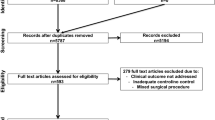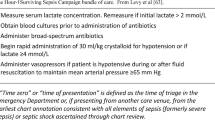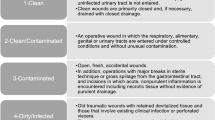Abstract
Background
Part of the ongoing healthcare debate is the care of uninsured patients. A common theory is that without regular outpatient care, these patients present to the hospital in the late stages of disease and therefore have worse outcomes. The purpose of this study was to evaluate any differences in outcomes after laparoscopic cholecystectomies between insured and uninsured patients.
Methods
We reviewed all laparoscopic cholecystectomies (LC) done in our institution between 2006 and 2009. Patients were divided into two groups: insured patients (IP) and uninsured patients (UIP). Outcomes, including conversion and complication rates and postoperative length of stay (LOS), were collected and statistically analyzed using χ2 and ANOVA tests.
Results
There were 1,090 LCs done during the study period: 944 patients (86.6 %) were insured (IP) and 146 (13.4 %) were uninsured (UIP). In the IP group there were 63/944 (6.7 %) conversions and 59/944 (6.3 %) complications, while in the UIP group there were 15/146 (10.3 %) conversions and 12/146 (8.2 %) complications. There was no statistically significant difference in either of these categories. Mean (±SD) LOS was 1.73 ± 4.34 days for the IP group and 2.72 ± 4.35 days for the UIP group (p = 0.010, ANOVA). Uninsured patients were much more likely to have emergency surgery (99.3 % vs. 47.9 %, p < 0.001, χ2).
Conclusions
In our study group, being uninsured did not correlate with having a higher rate of conversion or complications. However, more uninsured patients had their surgery done emergently, and this led to significantly longer lengths of stay. Further research is necessary to study the cost impact of these findings and to see whether insuring these patients can lead to changes in their outcomes.
Similar content being viewed by others
References
U.S. Census Bureau (2011) Income, poverty, and health insurance coverage in the United States: 2010. US Government Printing Office, Washington
Centers for Medicare & Medicaid Services (2010) 2010 Actuarial report on the financial outlook for medicaid. US Government Printing Office, Washington, DC
Halpern MT, Ward EM, Pavluck AL, Schrag NM, Bian J, Chen AY (2008) Association of insurance status and ethnicity with cancer stage at diagnosis for 12 cancer sites: a retrospective analysis. Lancet Oncol 9:222–231
Parikh PB, Gruberg L, Jeremias A, Chen JJ, Naidu SS, Shlofmitz RA, Brener SJ, Pappas T, Marzo KP, Brown DL (2011) Association of health insurance status with presentation and outcomes of coronary artery disease among nonelderly adults undergoing percutaneous coronary intervention. Am Heart J 162:512–517
Ng DK, Brotman DJ, Lau B, Young JH (2012) Insurance status, not race, is associated with mortality after an acute cardiovascular event in Maryland. J Gen Intern Med 27:1368–1376
Dozier KC, Miranda MA Jr, Kwan RO, Cureton EL, Sadjadi J, Victorino GP (2010) Insurance coverage is associated with mortality after gunshot trauma. J Am Coll Surg 210:280–285
Taghavi S, Jayarajan SN, Duran JM, Gaughan JP, Pathak A, Santora TA, Willis AI, Goldberg AJ (2012) Does payer status matter in predicting penetrating trauma outcomes? Surgery 152:227–231
Shaffer EA (2006) Gallstone disease: epidemiology of gallbladder stone disease. Best Pract Res Clin Gastroenterol 20:981–996
Greenstein AJ, Moskowitz A, Gelijns AC, Egorova NN (2012) Payer status and treatment paradigm for acute cholecystitis. Arch Surg 147:453–458
Carbonell AM, Lincourt AE, Kercher KW, Matthews BD, Cobb WS, Sing RF, Heniford BT (2005) Do patient or hospital demographics predict cholecystectomy outcomes? A nationwide study of 93,578 patients. Surg Endosc 19:767–773
Varela JE, Nguyen NT (2011) Disparities in access to basic laparoscopic surgery at U.S. academic medical centers. Surg Endosc 25:1209–1214
DeVoe JE, Fryer GE, Phillips R, Green L (2003) Receipt of preventive care among adults: insurance status and usual source of care. Am J Public Health 93:786–791
Lyon SM, Benson NM, Cooke CR, Iwashyna TJ, Ratcliffe SJ, Kahn JM (2011) The effect of insurance status on mortality and procedural use in critically ill patients. Am J Respir Crit Care Med 184:809–815
Fowler RA, Noyahr LA, Thornton JD, Pinto R, Kahn JM, Adhikari NK, Dodek PM, Khan NA, Kalb T, Hill A, O’Brien JM, Evans D, Curtis JR (2010) An official American Thoracic Society systematic review: the association between health insurance status and access, care delivery, and outcomes for patients who are critically ill. Am J Respir Crit Care Med 181:1003–1011
LaPar DJ, Bhamidipati CM, Mery CM, Stukenborg GJ, Jones DR, Schirmer BD, Kron IL, Ailawadi G (2010) Primary payer status affects mortality for major surgical operations. Ann Surg 252:544–550; discussion 550–541
Farkas DT, Moradi D, Moaddel D, Nagpal K, Cosgrove JM (2012) The impact of body mass index on outcomes after laparoscopic cholecystectomy. Surg Endosc 26(4):964–969
Raman SR, Moradi D, Samaan BM, Chaudhry US, Nagpal K, Cosgrove JM, Farkas DT (2012) The degree of gallbladder wall thickness and its impact on outcomes after laparoscopic cholecystectomy. Surg Endosc 26(11):3174–3179
Paajanen H, Suuronen S, Nordstrom P, Miettinen P, Niskanen L (2011) Laparoscopic versus open cholecystectomy in diabetic patients and postoperative outcome. Surg Endosc 25:764–770
Simopoulos C, Botaitis S, Polychronidis A, Tripsianis G, Karayiannakis AJ (2005) Risk factors for conversion of laparoscopic cholecystectomy to open cholecystectomy. Surg Endosc 19:905–909
Chandio A, Timmons S, Majeed A, Twomey A, Aftab F (2009) Factors influencing the successful completion of laparoscopic cholecystectomy. JSLS 13:581–586
Rosen M, Brody F, Ponsky J (2002) Predictive factors for conversion of laparoscopic cholecystectomy. Am J Surg 184:254–258
American Cancer Society (2011) Cancer Prevention & early detection facts & figures 2011. American Cancer Society, Atlanta. Available at http://www.cancer.org/research/cancerfactsfigures/cancerpreventionearlydetectionfactsfigures/cancer-prevention-early-detection-facts-figures-2011
Shi L, Lebrun LA, Zhu J, Tsai J (2011) Cancer screening among racial/ethnic and insurance groups in the United States: a comparison of disparities in 2000 and 2008. J Health Care Poor Underserved 22:945–961
Farkas DT, Greenbaum A, Singhal V, Cosgrove JM (2012) Effect of insurance status on the stage of breast and colorectal cancers in a safety-net hospital. Am J Manag Care 18:SP65–SP70
Ward EM, Fedewa SA, Cokkinides V, Virgo K (2010) The association of insurance and stage at diagnosis among patients aged 55 to 74 years in the national cancer database. Cancer J 16:614–621
Haider AH, Chang DC, Efron DT, Haut ER, Crandall M, Cornwell EE 3rd (2008) Race and insurance status as risk factors for trauma mortality. Arch Surg 143:945–949
Hollis S, Lecky F, Yates DW, Woodford M (2006) The effect of pre-existing medical conditions and age on mortality after injury. J Trauma 61:1255–1260
Batchelor WB, Ellis SG, Ormiston JA, Stone GW, Joshi AA, Wang H, Underwood PL (2012) Racial differences in long-term outcomes after percutaneous coronary intervention with paclitaxel-eluting coronary stents. J Interv Cardiol. doi:10.1111/j.1540-8183.2012.00760.x
Dibardino DJ, Pasquali SK, Hirsch JC, Benjamin DK, Kleeman KC, Salazar JD, Jacobs ML, Mayer JE, Jacobs JP (2012) Effect of sex and race on outcome in patients undergoing congenital heart surgery: an analysis of the Society of Thoracic Surgeons Congenital Heart Surgery Database. Ann Thorac Surg 94(6):2054–2060
Lapar DJ, Bhamidipati CM, Walters DM, Stukenborg GJ, Lau CL, Kron IL, Ailawadi G (2011) Primary payer status affects outcomes for cardiac valve operations. J Am Coll Surg 212:759–767
Murphy MM, Ng SC, Simons JP, Csikesz NG, Shah SA, Tseng JF (2010) Predictors of major complications after laparoscopic cholecystectomy: surgeon, hospital, or patient? J Am Coll Surg 211:73–80
Disclosures
Ms. Neureuther, Dr. Nagpal, Mr. Greenbaum, Dr. Cosgrove, and Dr. Farkas have no conflicts of interest or financial ties to disclose.
Author information
Authors and Affiliations
Corresponding author
Rights and permissions
About this article
Cite this article
Neureuther, S.J., Nagpal, K., Greenbaum, A. et al. The effect of insurance status on outcomes after laparoscopic cholecystectomy. Surg Endosc 27, 1761–1765 (2013). https://doi.org/10.1007/s00464-012-2675-8
Received:
Accepted:
Published:
Issue Date:
DOI: https://doi.org/10.1007/s00464-012-2675-8




